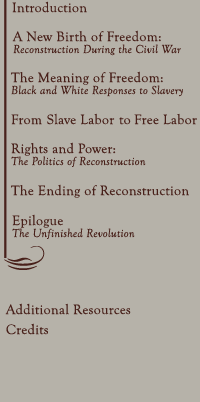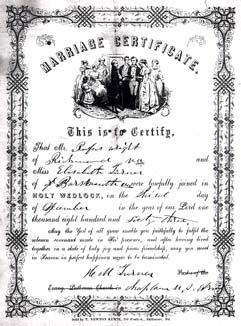





Marriage certificate, 1862.
(National Archives)
Click image to enlarge.
Before the Civil War, slave marriages had no legal standing. During the war, blacks serving in the Union Army married under military authority. Henry M. Turner, one of the first black chaplains to serve in the Union Army, officiated at the wedding of Rufus Wright and Elisabeth Turner.
![]() Learn more
about this certificate
Learn more
about this certificate
On June 21, 1864, six months after his marriage, Wright died of abdominal
wounds received in action at Petersburg. His widow's legal status enabled
her to receive pension benefits from the federal government.
Copyright
2003